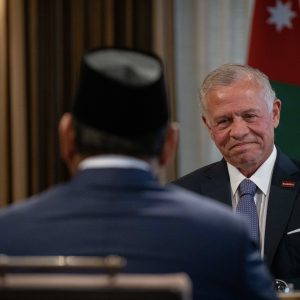Israel ‘pause’ in Gaza had no impact on aid supplies: WHO
Geneva, Switzerland – AFP
A daily “pause” the Israeli military declared in Gaza to facilitate aid flows has had no impact on deliveries of badly needed supplies, says the UN health agency.
More than eight months of attacks by Israel have led to dire humanitarian conditions in the Palestinian territory and repeated UN warnings of famine.
“We did not see an impact on the humanitarian supplies coming in since that… unilateral announcement of this technical pause,” said Richard Peeperkorn, the World Health Organization (WHO) representative in the Palestinian territories.
Medical charity Doctors Without Borders (MSF) warned in a statement that “without a significant refill of medical supplies in the coming days” the NGO may have to “stop or drastically reduce some of its medical activities in Gaza”.
Over the weekend, the Israeli military announced a daily humanitarian “pause” in fighting on a key road in southern Gaza.
Days later, however, a United Nations spokesman said “this has yet to translate into more aid reaching people in need”.
According to the WHO, as of May 17, only 750 people remained in the city of Rafah.
There were between 60,000 and 75,000 in the Al-Mawasi area in the south of the Gaza Strip, where many Palestinians have taken refuge since the start of the Israeli offensive in Rafah.
Dr Thanos Gargavanis, a trauma surgeon and emergency officer at the WHO, said the UN in Gaza was trying to “operate in an unworkable environment”.
“We have patients with severe burns, open fractures, and we don’t even have enough painkillers to alleviate their suffering,” said MSF medical coordinator Guillemette Thomas.
Thomas said that in Nasser and Al Aqsa hospitals, MSF teams had been forced to reduce the “frequency of dressing changes for patients with severe burns due to the lack of sterile compress gauzes”, which could lead to more infections.
MSF has 400 local Palestinian employees and between 20 and 30 international staff in Gaza.
– Medical evacuations –
MSF and the WHO are calling for the Rafah crossing between Gaza and Egypt to be reopened for humanitarian aid and medical evacuations.
Another alternative for medical evacuations would be the Kerem Shalom crossing in Israel, Peeperkorn said, adding that it should only be done when safe.
It would be “for a sustained transfer of patients from Gaza to the West Bank and East Jerusalem referral hospitals. Just like it was prior to the war,” he said.
“We have six trucks, filled with 37 tons of supplies, the vast majority of which are essential medical items that have been waiting since June 14,” MSF’s Thomas said, adding that the situation was “incomprehensible and unacceptable”.
According to the WHO, only 17 of the 36 hospitals in Gaza are operational, and even then, only partially.
Some 4,900 patients have been evacuated from Gaza for war-related or chronic medical reasons since October 7, and the WHO currently estimates that at least 10,000 more people need to be evacuated.
No patients have been evacuated since the closure of the Rafah crossing on May 7, the WHO added.
Israel has killed at least 37,431 people, more than half of them women and children, according to the local health ministry.











